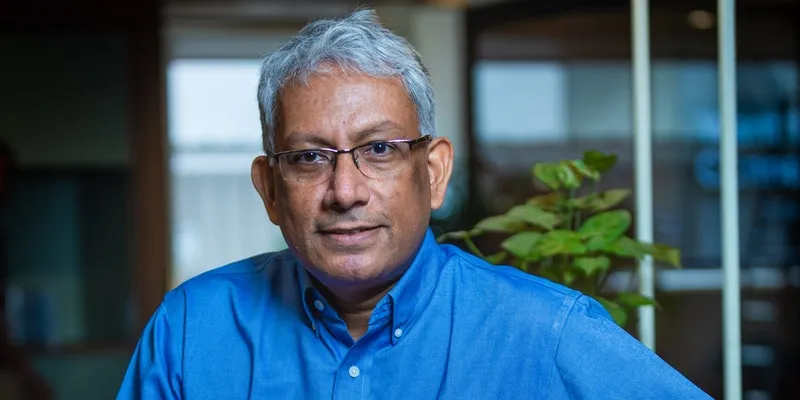COVID-19 a giant opportunity for MSMEs who must learn to survive: GAME Founder Ravi Venkatesan
Amid the uncertainty around the nationwide lockdown due to coronavirus, SMBStory spoke to Ravi Venkatesan, Founder and Chairman, Global Alliance for Mass Entrepreneurship (GAME), over what impact will COVID-19 have on MSMEs.
The coronavirus pandemic has brought the world to a standstill. The worst affected segment in this crisis unarguably is the micro, small and medium enterprises (MSMEs).
With businesses shut off and fixed costs dangling over them, SMEs and MSMEs are unable to handle the situation. While this section of the business ecosystem is not new to surprises and shocks, thanks to demonetisation and the changes brought when the new Goods and Services Tax (GST) policy was introduced, COVID-19 has nonetheless brought a unique predicament in the lives of entrepreneurs of small and medium businesses.

Ravi Venkatesan, Founder and Chairman, Global Alliance for Mass Entrepreneurship (GAME)
Amid the uncertainty looming around the situation of this segment, SMBStory spoke to Ravi Venkatesan, Founder and Chairman of the Global Alliance for Mass Entrepreneurship (), over what impact measures such as lockdowns due to COVID-19 are going to have on MSMEs, and how it is in the process of creating a $100 million SME Stabilisation Fund for this situation.
SMBStory: What impact is COVID-19 going to have on MSMEs?
Ravi Venkatesan: When we think about COVID-19, there are more questions and unknowns than there are knowns and answers. The scenario that I worry about, particularly when it comes to MSMEs, is what I call a mass extinction.
The coronavirus outbreak is a shock to the entire system of society. And typically, these enterprises are very fragile. They don't have the resilience of a larger company, and are therefore greatest at risk. So, if this thing drags on for a long time, and if we don't do enough to throw a lifeline to them, keep them alive, and then help them adapt, more than half of them will die and won't recover. This could be a catastrophe for us.
SMBS: Tell us something about the fund is planning to launch and how it will help MSMEs.
RV: In the last 10 days, the GAME team has spoken to hundreds of organisations, entrepreneurs, and small businesses, and we have developed a pretty comprehensive understanding of the kinds of issues they are facing.
So, the number one issue for all of them is cash. Their revenues have gone to zero, their vendors have stopped paying them, and the receivables are completely frozen. Even when the lockdown is removed, the recovery is not going to be overnight.
So we have to figure out how to get more liquidity to them. And for that matter, we, at GAME, are trying to create a $100 million-plus SME Stabilization Fund, through which will give low-interest working capital loans to eligible SMEs.
$100 million sounds like a large number, but it's a drop in the bucket compared to the need, but we are hoping that if we can demonstrate the impact with this, then many others can pile on.
SMBS: What are the sources you are reaching out to put this fund together and when are you looking at launching this fund?
RV: We are also in touch with a lot of microfinance bodies and non-banking financial companies (NBFCs) because MSMEs don’t go to banks for loans, they go to these places.
What we would do is to offer a very low-interest product to microfinance companies and NBFCs so that the effective interest rate they can charge remains about six percent.
The tenures of these loans will be about 15 months of which there is a moratorium interest on the first three months. The interest rate will start clicking from the fourth month for the remaining 12 months.
Now, when this fund will be launched depends entirely on our ability to raise it. So we're talking to both philanthropic organizations as well as mainstream and commercial organisations. Speed is critical, because right now MSMEs are running out of cash. If it takes three months to launch this product, it may be too late.
So we need to ensure that the first close happens within about 20 days and we need to be out there within the month of April.
SMBS: MSMEs have been dealing with several changes, whether it is the demonetisation or GST. How do you argue the impact of these policies on them?
RV: There's no question that demonetisation did not help the small and medium enterprises. It has had a huge impact from which they were just recovering when GST came. GST also had a huge impact on them as it introduced the costs of formalisation on many of them. So they were just getting used to this when COVID-19 hit them like a tsunami.
No point saying ‘Oh! Was Demonetisation good or bad? We wish it hadn't happened.’ But it has happened, and that’s the reality. Now better embrace today's reality and figure out how to survive and find an opportunity that matters. The more you spend time looking in the rearview mirror, the more likely you are to not survive.
SMBS: What can the MSMEs do in the current times to lessen the impact of COVID-19, and what is the way forward?
RV: Now some of the measures that were announced by the Reserve Bank of India (RBI), in particular, could be potentially helpful. We are waiting to see what kind of economic stimulus the Finance Minister announces in the second wave.
The immediate thing to do is to ensure the safety and well-being of your employees, taking all the right precautions. There is a lot of irresponsible behaviour by firms where they are not enforcing hygiene measures like not insisting that everyone wears a mask. Japan and South Korea were able to slow down the impact of coronavirus not by some crazy lockdown, but by simply implementing some good social practices, like 100 percent use of masks. We need to find the most useful ideas to combat this situation — like recognising your most loyal customers and asking them if they will give you advances.
In addition, entrepreneurs also need to figure out what the world needs and not what they used to produce.
And lastly, MSMEs have to organise. They need to come together around industry associations. One of the reasons why Indian IT has been so successful is because they have organised NASSCOM. We are trying to do the same at GAME, bringing entrepreneurs together who can listen to each other.
This crisis is also a giant opportunity. Those who can survive in the immediate term and adapt, are going to flourish, the rest are going to die. There is no middle ground, you're either going to flourish, or you're going to die. So figure out now.
SMBS: MSMEs were seen as an important catalyst in helping India achieve the Prime Minister’s goal of becoming a $5 trillion dollar economy. Now with MSMEs being the worst impacted, how do you see the aspirational goal shaping out?
RV: MSMEs are very important for the Indian economy, and I look at their contribution more towards employment than GDP. There are about 70 million MSMEs which employ one in 10 people. And they comprise more than 95 percent of all businesses. They collectively employ 110 million people.
COVID-19 is a giant reset for most of the economies including India. So the projections right now are negative GDP growth which is unthinkable, right? We were already worried about 4.5 percent and now we're looking at the negative realm. Also, we don't know how fast the economy can and will recover because we don't know the behaviour of this virus.
All said and done, there's no doubt that without the SME sector flourishing, India cannot have a balanced economy or a real and sustainable growth. And what we had in the ‘pre-COVID’ era is often called a missing middle. India either has a very large number of small enterprises which are self-employed, or have less than 10 employees, or we have a few really big firms like the Tatas and Reliance. India is a very strange economy for us.
Almost no other large economy has midsize firms that are completely missing. But let's use this crisis as an opportunity to get many more entrepreneurially-minded people thinking about opportunities. Furthermore, we need to focus less on what the government can do and should focus more on what we can do.
(Edited by Kanishk Singh)









